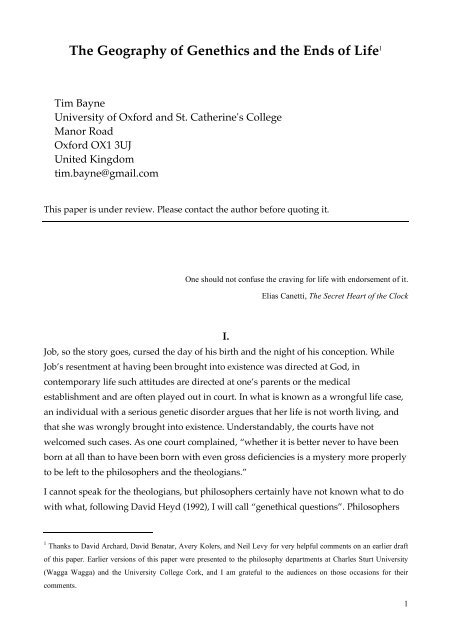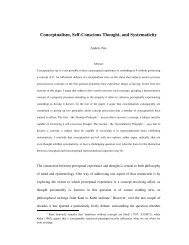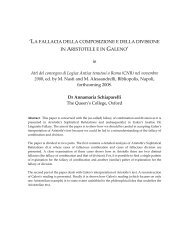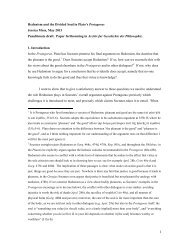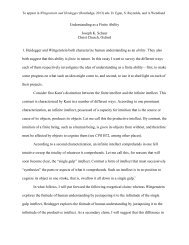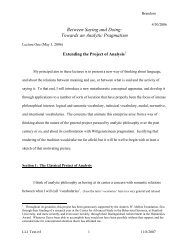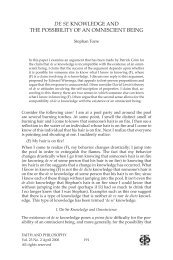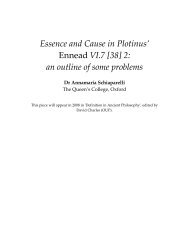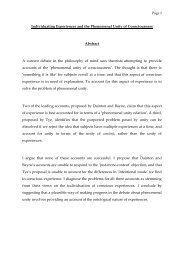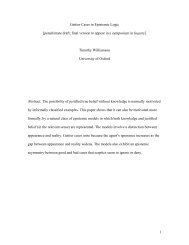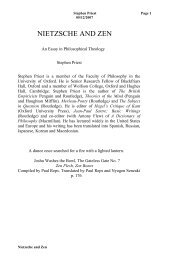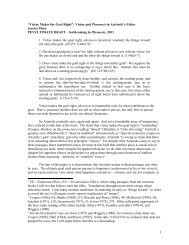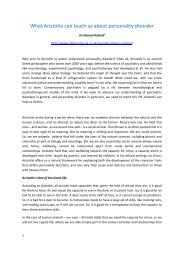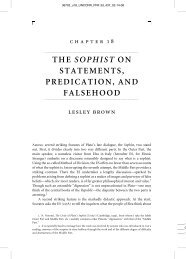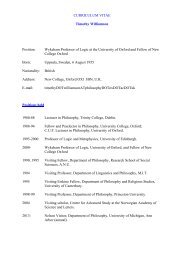The Geography of Genethics and the Ends of Life1 - University of ...
The Geography of Genethics and the Ends of Life1 - University of ...
The Geography of Genethics and the Ends of Life1 - University of ...
You also want an ePaper? Increase the reach of your titles
YUMPU automatically turns print PDFs into web optimized ePapers that Google loves.
<strong>The</strong> <strong>Geography</strong> <strong>of</strong> <strong>Genethics</strong> <strong>and</strong> <strong>the</strong> <strong>Ends</strong> <strong>of</strong> Life 1<br />
Tim Bayne<br />
<strong>University</strong> <strong>of</strong> Oxford <strong>and</strong> St. Ca<strong>the</strong>rine's College<br />
Manor Road<br />
Oxford OX1 3UJ<br />
United Kingdom<br />
tim.bayne@gmail.com<br />
This paper is under review. Please contact <strong>the</strong> author before quoting it.<br />
One should not confuse <strong>the</strong> craving for life with endorsement <strong>of</strong> it.<br />
Elias Canetti, <strong>The</strong> Secret Heart <strong>of</strong> <strong>the</strong> Clock<br />
I.<br />
Job, so <strong>the</strong> story goes, cursed <strong>the</strong> day <strong>of</strong> his birth <strong>and</strong> <strong>the</strong> night <strong>of</strong> his conception. While<br />
Job’s resentment at having been brought into existence was directed at God, in<br />
contemporary life such attitudes are directed at one’s parents or <strong>the</strong> medical<br />
establishment <strong>and</strong> are <strong>of</strong>ten played out in court. In what is known as a wrongful life case,<br />
an individual with a serious genetic disorder argues that her life is not worth living, <strong>and</strong><br />
that she was wrongly brought into existence. Underst<strong>and</strong>ably, <strong>the</strong> courts have not<br />
welcomed such cases. As one court complained, “whe<strong>the</strong>r it is better never to have been<br />
born at all than to have been born with even gross deficiencies is a mystery more properly<br />
to be left to <strong>the</strong> philosophers <strong>and</strong> <strong>the</strong> <strong>the</strong>ologians.”<br />
I cannot speak for <strong>the</strong> <strong>the</strong>ologians, but philosophers certainly have not known what to do<br />
with what, following David Heyd (1992), I will call “genethical questions”. Philosophers<br />
1 Thanks to David Archard, David Benatar, Avery Kolers, <strong>and</strong> Neil Levy for very helpful comments on an earlier draft<br />
<strong>of</strong> this paper. Earlier versions <strong>of</strong> this paper were presented to <strong>the</strong> philosophy departments at Charles Sturt <strong>University</strong><br />
(Wagga Wagga) <strong>and</strong> <strong>the</strong> <strong>University</strong> College Cork, <strong>and</strong> I am grateful to <strong>the</strong> audiences on those occasions for <strong>the</strong>ir<br />
comments.<br />
1
disagree about whe<strong>the</strong>r a person can be wronged or benefited by being brought into<br />
existence, <strong>and</strong> if <strong>the</strong>y can, under what conditions someone is wronged or benefited by<br />
being brought into existence. My main goal in this paper is to clarify <strong>the</strong> logical geography<br />
<strong>of</strong> genethics. I proceed in two stages. In <strong>the</strong> first sections <strong>of</strong> <strong>the</strong> paper I argue that<br />
genethical judgments ought to be context-insensitive. That is, <strong>the</strong> truth-value <strong>of</strong> genethical<br />
claims does not depend on <strong>the</strong> context <strong>of</strong> <strong>the</strong> attributer <strong>of</strong> <strong>the</strong> judgment. I <strong>the</strong>n examine<br />
three genethical models: <strong>the</strong> no-faults model, <strong>the</strong> dual benchmark model, <strong>and</strong> <strong>the</strong> parity<br />
model. None <strong>of</strong> <strong>the</strong> three models is without problems, but it seems to me that <strong>the</strong> parity<br />
model, according to which our judgments about <strong>the</strong> value <strong>of</strong> coming into existence ought<br />
to be constrained by our judgments about <strong>the</strong> value <strong>of</strong> death, has <strong>the</strong> most going for it.<br />
II.<br />
Genethical questions arise in different contexts. One context is Job’s. We can ask whe<strong>the</strong>r<br />
actual lives—our own or those <strong>of</strong> o<strong>the</strong>r individuals—are or have been worth living. Call<br />
such contexts retrospective contexts. Genethical questions also occur in prospect. Would-be<br />
procreators ask <strong>the</strong>mselves what kinds <strong>of</strong> people it is permissible or reasonable to create.<br />
Call such contexts prospective contexts.<br />
It is intuitively plausible to suppose that retrospective <strong>and</strong> prospective genethics ought to<br />
constrain each o<strong>the</strong>r in certain ways. Let us consider some cases first, <strong>and</strong> <strong>the</strong>n turn to <strong>the</strong><br />
question <strong>of</strong> general principles.<br />
Amy was born with a terrible disease that prevents her from enjoying many <strong>of</strong> life’s<br />
goods. Amy faces a bleak future. She is in constant pain, <strong>and</strong> wishes that she had never<br />
been born. Suppose that Amy’s parents deliberately conceived Amy, despite having had<br />
good reason to believe that she would be born with this disease <strong>and</strong> that it would impair<br />
<strong>the</strong> quality <strong>of</strong> her life in <strong>the</strong> ways that it has. It seems to me that it would be strange to<br />
hold that it is reasonable for Amy to regret having been born <strong>and</strong> yet think that her<br />
parents did nothing wrong in deliberately having her; after all, <strong>the</strong>y knew that she would<br />
have <strong>the</strong> kind <strong>of</strong> life she has, <strong>and</strong> <strong>the</strong>y now accept that Amy’s regret at having been born<br />
is reasonable. Judging that Amy’s regret at having been born is reasonable ought to go<br />
h<strong>and</strong>-in-h<strong>and</strong> with judging that her parents acted impermissibly—or at least<br />
unreasonably—in deliberately conceiving her.<br />
Tom’s parents were in much <strong>the</strong> same situation as Amy’s parents: <strong>the</strong>y conceived him in<br />
<strong>the</strong> knowledge that <strong>the</strong>y were almost certainly going to have a blind child. At <strong>the</strong> time,<br />
<strong>the</strong>y wondered whe<strong>the</strong>r <strong>the</strong>y were doing <strong>the</strong> right thing; many <strong>of</strong> <strong>the</strong>ir friends <strong>and</strong> family<br />
advised <strong>the</strong>m to adopt a child, or to refrain from having children. But Tom’s parents<br />
reasoned as follows: “Having been born, Tom is likely to be glad to have come into<br />
2
existence. How <strong>the</strong>n could it be wrong for us to bring him into existence?” Let us<br />
suppose—as seems not unreasonable—that Tom is glad to have been brought into<br />
existence. Tom’s parents might appeal to this fact to justify <strong>the</strong>ir decision to have him.<br />
And it seems to me that <strong>the</strong>ir appeal has some force: if Tom’s endorsement <strong>of</strong> his life is<br />
reasonable, <strong>the</strong>n <strong>the</strong>re is a prima facie case for thinking that his parents did nothing<br />
wrong in knowingly bringing him into existence. 2<br />
<strong>The</strong>se cases suggest that first-person <strong>and</strong> third-person genethical judgments ought to<br />
constrain each o<strong>the</strong>r: <strong>The</strong> fact that someone does—or would—regret having come into<br />
existence gives one reason not to bring <strong>the</strong>m into existence, <strong>and</strong> <strong>the</strong> fact that someone<br />
does not—or would not—regret coming into existence means that one does not have a<br />
person-regarding reason to avoid bringing <strong>the</strong>m into existence. In <strong>the</strong> following three<br />
sections I explore (<strong>and</strong> defend) <strong>the</strong> notion that retrospective <strong>and</strong> prospective genethics<br />
ought to constrain each o<strong>the</strong>r. I examine three ways in which <strong>the</strong>se two genethical<br />
perspectives might differ from each o<strong>the</strong>r, <strong>and</strong> argue that none <strong>of</strong> <strong>the</strong>se differences makes<br />
a difference.<br />
III.<br />
One difference between retrospective <strong>and</strong> prospective genethics concerns <strong>the</strong> relationship<br />
between <strong>the</strong> target <strong>of</strong> <strong>the</strong> genethical judgment <strong>and</strong> <strong>the</strong> person making <strong>the</strong> judgment (<strong>the</strong><br />
attributer). Retrospective genethics can take ei<strong>the</strong>r a first-person or a third-person form.<br />
We can hold evaluative attitudes to both our own lives <strong>and</strong> also <strong>the</strong> lives <strong>of</strong> o<strong>the</strong>rs.<br />
Prospective genethics, by contrast, necessarily takes a third-person form: one cannot<br />
wonder whe<strong>the</strong>r or not to bring oneself into existence. Might <strong>the</strong> distinction between firstperson<br />
<strong>and</strong> third person perspective drive a wedge between retrospective genethics <strong>and</strong><br />
prospective genethics?<br />
I think not. It seems implausible to suppose that <strong>the</strong> truth-value <strong>of</strong> genethical judgements<br />
should be a function <strong>of</strong> who is making <strong>the</strong> judgement. It seems to me that both firstperson<br />
<strong>and</strong> third-person genethical judgments should be grounded in <strong>the</strong> same fact: viz.,<br />
<strong>the</strong> quality <strong>of</strong> <strong>the</strong> life in question. If <strong>the</strong> quality <strong>of</strong> a person’s life is observer-independent,<br />
it follows that first-person <strong>and</strong> third-person genethics should proceed in parallel. And it<br />
seems to me that <strong>the</strong> quality <strong>of</strong> a person’s life is observer-independent: S’s life cannot be<br />
worth living from A’s perspective but not from B’s perspective. I think this claim holds<br />
2 Note that to say that Tom’s endorsement <strong>of</strong> his life is reasonable is not to say that people cannot be wrong about <strong>the</strong><br />
value <strong>of</strong> <strong>the</strong>ir own lives (to <strong>the</strong>m). Even if tend to over-estimate our own levels <strong>of</strong> well-being, we none<strong>the</strong>less have<br />
good reason to take seriously people’s judgments concerning <strong>the</strong>ir own level <strong>of</strong> well-being in asking whe<strong>the</strong>r or not it<br />
would be reasonable to bring <strong>the</strong>m into existence.<br />
3
true even when B is S, that is, when one <strong>of</strong> those evaluating <strong>the</strong> life is also <strong>the</strong> subject <strong>of</strong><br />
<strong>the</strong> life in question. I do not deny that A <strong>and</strong> B might disagree about whe<strong>the</strong>r or not S’s<br />
life is worth living. Nor do I deny that individuals generally have a privileged epistemic<br />
position when it comes to evaluating whe<strong>the</strong>r or not <strong>the</strong>ir own lives are worth living. Nor<br />
am I claiming that <strong>the</strong>re is always a fact <strong>of</strong> <strong>the</strong> matter as to whe<strong>the</strong>r or not a life is worth<br />
living.<br />
A second difference between prospective <strong>and</strong> retrospective genethics is obviously<br />
temporal. Retrospective judgments are made during or subsequent to <strong>the</strong> life <strong>of</strong> <strong>the</strong> target<br />
subject, whereas prospective genethics arises prior to <strong>the</strong> birth <strong>of</strong> <strong>the</strong> target subject (if,<br />
indeed, <strong>the</strong>re is an actual target). Could temporal differences justify differences between<br />
prospective <strong>and</strong> retrospective genethical judgments?<br />
It is certainly true that <strong>the</strong> judgments we make about <strong>the</strong> quality <strong>of</strong> our own lives are<br />
temporally sensitive. As Francis Kamm has pointed out, in contemplating our lives in<br />
prospect, we seem to place a lot <strong>of</strong> weight on <strong>the</strong> goods <strong>and</strong> <strong>the</strong> bads <strong>of</strong> sensation <strong>and</strong><br />
experience, whereas in evaluating our lives retrospectively we emphasize <strong>the</strong> goods <strong>and</strong><br />
bads <strong>of</strong> achievement over those <strong>of</strong> experience; we give more weight to what we have done<br />
than what we have suffered (1993: 34). Might <strong>the</strong>se differences drive a wedge between<br />
prospective genethics <strong>and</strong> retrospective genethics? <strong>The</strong> perspective <strong>of</strong> those asking<br />
prospective genethical question is, in some sense, temporally prior to <strong>the</strong> target <strong>of</strong> <strong>the</strong>ir<br />
deliberations. Any child that would-be procreators decide to produce will, <strong>of</strong> course, exist<br />
subsequent to <strong>the</strong>ir deliberations. So, if future experiences count more than past<br />
experiences, <strong>and</strong>/or past achievements count more than future achievements, we have <strong>the</strong><br />
beginnings <strong>of</strong> an explanation as to how prospective genethics <strong>and</strong> retrospective genethics<br />
might dissociate.<br />
Of course, we should ask whe<strong>the</strong>r <strong>the</strong> temporal sensitivity that Kamm has uncovered is<br />
reasonable. It is one thing to claim that we do evaluate our lives in temporally sensitive<br />
ways, it is ano<strong>the</strong>r thing to claim that such attitudes are reasonable. <strong>The</strong>re is certainly<br />
something puzzling about <strong>the</strong> notion that <strong>the</strong> value <strong>of</strong> one’s life might depend on how far<br />
through it one is. Fur<strong>the</strong>rmore, Kamm’s asymmetry seems to have intuitive force only in<br />
<strong>the</strong> context <strong>of</strong> first-person judgments, <strong>and</strong> does not appear to extend to third-person<br />
judgments. It is not clear what to make <strong>of</strong> this asymmetry between first- <strong>and</strong> third-person<br />
judgments, but at <strong>the</strong> very least it suggests that Kamm’s intuition provides no obstacle to<br />
<strong>the</strong> thought that we should dem<strong>and</strong> constraints between different third-person genethical<br />
judgments.<br />
4
A final point <strong>of</strong> contrast between retrospective <strong>and</strong> prospective genethics concerns <strong>the</strong><br />
modal status <strong>of</strong> <strong>the</strong> respective judgments. In retrospective genethics <strong>the</strong> attributer <strong>and</strong><br />
target <strong>of</strong> attribution are always world-mates – that is, <strong>the</strong>y exist in <strong>the</strong> same possible<br />
world. This is not true <strong>of</strong> prospective genethics. Sometimes <strong>the</strong> attributer(s) <strong>and</strong> target<br />
will be world-mates, as when prospective procreators become actual procreators. In o<strong>the</strong>r<br />
situations <strong>the</strong> attributer(s) <strong>and</strong> target are not world-mates, as when prospective<br />
procreators decide against procreating.<br />
Might <strong>the</strong> modal differences between retrospective <strong>and</strong> prospective genethics provide us<br />
with a wedge between <strong>the</strong>m? I think not, for modal differences locate <strong>the</strong> distinction in <strong>the</strong><br />
wrong place. Ra<strong>the</strong>r than separating retrospective from prospective genethics, <strong>the</strong>y would<br />
distinguish retrospective contexts in which <strong>the</strong> attributer(s) <strong>and</strong> target are world-mates<br />
from retrospective contexts in which <strong>the</strong> attributer(s) <strong>and</strong> target are not world-mates. This<br />
would be a strange result. Whe<strong>the</strong>r or not a certain genethical decision is reasonable ought<br />
not to depend on whe<strong>the</strong>r it is carried out!<br />
IV.<br />
In <strong>the</strong> previous sections I explored <strong>the</strong> notion that genethical judgments ought to be<br />
context-invariant. In <strong>the</strong> remainder <strong>of</strong> this chapter I argue for a second kind <strong>of</strong> constraint<br />
on genethics, viz., that <strong>the</strong>re ought to be parity between our genethical judgments <strong>and</strong> our<br />
judgments about <strong>the</strong> value <strong>of</strong> death—what I will call mortethics.<br />
I divide genethical models into three groups: no-faults models, parity models, <strong>and</strong> dualbenchmark<br />
models. No-faults genethicists claim that coming into existence is not properly<br />
subject to moral evaluation, at least so far as <strong>the</strong> interests <strong>of</strong> <strong>the</strong> person that is brought into<br />
existence are concerned. No-faults genethicists do not deny that it can be wrong to bring<br />
someone into existence, for procreation can have adverse effects on <strong>the</strong> interests <strong>of</strong> thirdparties,<br />
but <strong>the</strong>y hold that it cannot be wrong on account <strong>of</strong> <strong>the</strong> well-being <strong>of</strong> <strong>the</strong> person<br />
who is brought into existence. A no-faults genethicist denies that it can be reasonable to<br />
have any evaluative attitude—ei<strong>the</strong>r regret or satisfaction—towards having come into<br />
existence.<br />
Parity <strong>the</strong>orists <strong>and</strong> dual-benchmark <strong>the</strong>orists share <strong>the</strong> view that it can be wrong to bring<br />
someone into existence on account <strong>of</strong> <strong>the</strong>ir well-being, <strong>and</strong> that it can be reasonable to<br />
regret having been created. <strong>The</strong> two positions are distinguished by where <strong>the</strong>y put <strong>the</strong><br />
genethical benchmark. To a first approximation, parity <strong>the</strong>orists insist that <strong>the</strong> level <strong>of</strong><br />
well-being that determines whe<strong>the</strong>r or not a life is worth starting is identical to that which<br />
determines whe<strong>the</strong>r or not it is worth continuing. (I explain below why this is true only to<br />
5
a first approximation.) <strong>The</strong> parity <strong>the</strong>orist insists on parity between genethics <strong>and</strong><br />
mortethics. Dual benchmark <strong>the</strong>orists reject any such parity. <strong>The</strong>y hold that our genethical<br />
judgments need not—<strong>and</strong> in fact should not—be brought into line with our judgments<br />
about <strong>the</strong> kinds <strong>of</strong> lives that are worth sustaining. <strong>The</strong> dual benchmark <strong>the</strong>orist posits one<br />
benchmark for genethics <strong>and</strong> ano<strong>the</strong>r for mortethics. In aretic terms, <strong>the</strong> level <strong>of</strong> wellbeing<br />
that makes a life worth creating is different from that which makes a life worth continuing.<br />
In principle, <strong>the</strong>re are two ways <strong>of</strong> being a dual benchmark <strong>the</strong>orist. On <strong>the</strong> one h<strong>and</strong>, one<br />
could hold that <strong>the</strong> life-worth-starting threshold is lower than <strong>the</strong> life-worth-continuing<br />
threshold. Although this version <strong>of</strong> <strong>the</strong> view is coherent, it is deeply implausible. To <strong>the</strong><br />
best <strong>of</strong> my knowledge, dual benchmark <strong>the</strong>orists are united in insisting that <strong>the</strong> lifeworth-starting<br />
benchmark is higher than <strong>the</strong> life-worth-continuing benchmark. As we will<br />
see, some dual benchmark <strong>the</strong>orists hold that <strong>the</strong> life-worth-starting benchmark is so high<br />
as to be practically unobtainable.<br />
V.<br />
<strong>The</strong> leading proponent <strong>of</strong> no-faults genethicism is David Heyd. In <strong>Genethics</strong> Heyd argues<br />
that coming into existence can be nei<strong>the</strong>r a harm nor a benefit. “It is equally meaningless<br />
to resent our parents for having been born unhappy as it is to be grateful for having been<br />
born happy” (1992: 109). Heyd thinks <strong>the</strong>re is something logically problematic with <strong>the</strong><br />
idea that one could harm or benefit someone by bringing <strong>the</strong>m into existence.<br />
No-faults genethics flies in <strong>the</strong> face <strong>of</strong> certain robust intuitions. Whe<strong>the</strong>r or not we think<br />
Job was justified in cursing <strong>the</strong> day <strong>of</strong> his birth, his actions certainly seem to have been<br />
coherent. It seems to be possible for someone to rationally regret having come into<br />
existence. What exactly is <strong>the</strong> problem meant to be?<br />
<strong>The</strong> problem, says Heyd, is with <strong>the</strong> notion that it is possible to be better <strong>of</strong>f in a world in<br />
which one does not exist than one is in a world in which one does exist (1992: 122).<br />
Indeed, <strong>the</strong> problem is with <strong>the</strong> notion that one could have any level <strong>of</strong> well-being— any<br />
level <strong>of</strong> ‘<strong>of</strong>fness’—in worlds from which one is absent. <strong>The</strong>re might be an impersonal<br />
sense <strong>of</strong> goodness in which worlds containing Job exists might be better than worlds in<br />
which he fails to exist, but, according to Heyd, it makes no sense to say that such worlds<br />
are better for Job. For a world to be good or bad for one, one must exist within it. Heyd<br />
concludes: “to be cannot in itself be ei<strong>the</strong>r good or bad, a subject <strong>of</strong> duty or prohibition, a<br />
right or wrong” (1992: 124).<br />
<strong>The</strong>se claims should have a familiar sound to those acquainted with <strong>the</strong> Epicurean view <strong>of</strong><br />
death. Epicureans hold that it is irrational to attach any moral or prudential value to one’s<br />
6
own death; one can be nei<strong>the</strong>r harmed nor benefited by death. Because death brings nonexistence,<br />
<strong>the</strong> states <strong>of</strong> being dead <strong>and</strong> alive are incommensurable with respect to levels <strong>of</strong><br />
welfare. <strong>The</strong> dead are nei<strong>the</strong>r better <strong>of</strong>f than <strong>the</strong> living, nor are <strong>the</strong>y worse <strong>of</strong>f; <strong>the</strong>y simply<br />
aren’t <strong>of</strong>f at all.<br />
This suggests that an Epicurean approach to mortethics goes h<strong>and</strong>-in-h<strong>and</strong> with a<br />
Heydian approach to genethics. If <strong>the</strong> transition from existence to non-existence can be<br />
bad (or good), why can’t <strong>the</strong> transition from non-existence to existence also be bad (or<br />
good)? If <strong>the</strong> event <strong>of</strong> one’s death can be morally evaluated on account <strong>of</strong> <strong>the</strong> harm or<br />
benefits it brings with it, why can’t <strong>the</strong> event <strong>of</strong> one’s birth?<br />
Heyd, however, rejects <strong>the</strong> Epicurean view <strong>of</strong> death. He presents two arguments for<br />
thinking that <strong>the</strong>re is an asymmetry between coming into existence <strong>and</strong> going out <strong>of</strong><br />
existence. <strong>The</strong> first is that death has a subject, “an identifiable individual whose life is cut<br />
short contrary to his or her interests” (Heyd 1992: 123). By contrast, <strong>the</strong>re is no identifiable<br />
individual who is brought from non-existence into existence: identity is always<br />
subsequent to existence. We can say <strong>of</strong> someone who died that she was deprived <strong>of</strong> her<br />
future, but we cannot say <strong>of</strong> a possible person who was not brought into existence that she<br />
was deprived <strong>of</strong> existence, for only in <strong>the</strong> former case do we have an actual subject <strong>of</strong><br />
harm.<br />
It is <strong>of</strong> course true that although <strong>the</strong> event <strong>of</strong> death brings about non-existence, death itself<br />
always involves a subject who is harmed. And it is also true that possible people who are<br />
not brought into existence are not deprived <strong>of</strong> existence. None<strong>the</strong>less, Heyd’s response<br />
leaves open <strong>the</strong> possibility that genethical judgments concerning people who have been<br />
(or will be) born are coherent, for in such cases we do have an actual subject to which<br />
harm (or benefit) can be ascribed. But to say this is to depart from <strong>the</strong> no-faults view, at<br />
least to some degree. Heyd’s view, remember, is that “to be cannot in itself be ei<strong>the</strong>r good<br />
or bad, a subject <strong>of</strong> duty or prohibition, a right or wrong” (1992: 124).<br />
Of course, no one is (directly) harmed by <strong>the</strong> decision not to instantiate a good life; <strong>and</strong>,<br />
correlatively, no one is (directly) benefited by <strong>the</strong> decision not to instantiate a bad life. So<br />
here <strong>the</strong>re is an asymmetry between genethical decisions <strong>and</strong> mortethical decisions: with<br />
respect to death, someone is (directly) affected no matter what we decide to do, whereas<br />
whe<strong>the</strong>r or not someone is (directly) affected by our decisions concerning birth depends<br />
on what we decide to do. But none <strong>of</strong> this undermines <strong>the</strong> point that if one can be harmed<br />
or benefited by going out <strong>of</strong> existence <strong>the</strong>n one can also be harmed or benefited by being<br />
created.<br />
7
Heyd’s second argument for an asymmetry between genethics <strong>and</strong> mortethics invokes a<br />
desire-based account <strong>of</strong> <strong>the</strong> badness <strong>of</strong> death. “[Categorical] desires make us not only<br />
wish to go on living (not to commit suicide), but also to be happy that we did not die two<br />
years ago. But <strong>the</strong>y cannot make us happy to have been born at all, since had we not been<br />
born <strong>the</strong>re would not have been any such categorical desires” (1992: 123). I am not<br />
convinced that one can account for <strong>the</strong> harm <strong>of</strong> death by appeal to desire, but let me<br />
waive that concern here, for Heyd’s argument fails even if we accept a desire-based<br />
account <strong>of</strong> death’s badness. If frustrated desire is able to explain death’s badness <strong>the</strong>n it<br />
can also explain <strong>the</strong> badness <strong>of</strong> having come into existence. It is true that I wouldn’t have<br />
had any categorical desires had I not been born, but it is also true that I wouldn’t have had<br />
any categorical desires now had I died two years ago. Heyd seems to confuse <strong>the</strong> claim<br />
that an actual person might wish to not have been born with <strong>the</strong> claim that a non-actual<br />
person might have had wishes. 3 <strong>The</strong> latter claim is incoherent, but <strong>the</strong> former claim is not.<br />
If it is coherent to prefer a future X over future Y on account <strong>of</strong> <strong>the</strong> fact that fewer <strong>of</strong> one’s<br />
categorical desires are left unsatisfied in X than in Y, <strong>the</strong>n it is coherent to regret that <strong>the</strong><br />
actual world is one in which one has many unsatisfied categorical desires (<strong>and</strong> few<br />
satisfied ones), ra<strong>the</strong>r than a world in which one doesn’t (<strong>and</strong> didn’t) exist <strong>and</strong> thus has no<br />
unsatisfied categorical desires (or, <strong>of</strong> course, satisfied ones).<br />
Bernard Williams once remarked that “while [a man] can think egoistically <strong>of</strong> what it<br />
would be for him to live longer or less long, he cannot think egoistically <strong>of</strong> what it would<br />
be for him never to have existed at all” (Williams 1973: 87). Can one think egoistically <strong>of</strong><br />
what it would be for <strong>the</strong> world to carry on without one? I think so. One can certainly wish<br />
to avoid a future <strong>of</strong> unrelieved suffering, <strong>and</strong> in this sense one can have an egoistic<br />
preference for a future that lacks oneself over a future that includes one. And if that is so, I<br />
don’t see why one can’t wish—on egoistic grounds—that one had never come into<br />
existence.<br />
I have not attempted to tackle no-faults genethicism head-on. Instead, I have argued that<br />
no-faults genethicists are committed to an Epicurean view <strong>of</strong> death. Epicureans, no doubt,<br />
will be nonplussed by this approach, but true Epicureans are few on <strong>the</strong> ground. Coupled<br />
with its intrinsic counter-intuitiveness, it seems to me that this result gives us good reason<br />
to look elsewhere for an acceptable genethical model. At <strong>the</strong> very least, this result<br />
provides us with a useful constraint on genethical <strong>the</strong>ory building.<br />
3 Holtug 2001 also makes this point.<br />
8
VI.<br />
Unlike no-faults genethicists, dual benchmark genethicists allow that an individual can be<br />
harmed (or, perhaps, benefited) by being created. Dual benchmark genethicists also accept<br />
that it can be reasonable for a person doomed to a truly miserable life to regret having<br />
been born. But how miserable is too miserable? According to <strong>the</strong> parity <strong>the</strong>orist, a life is<br />
too miserable to be created when, <strong>and</strong> only when, it is <strong>the</strong> kind <strong>of</strong> life that someone with it<br />
would be better <strong>of</strong>f dead. <strong>The</strong>re is a single threshold for lives that are worth creating <strong>and</strong><br />
lives that are worth continuing.<br />
Dual benchmark accounts reject this view. Here is Benatar’s statement <strong>of</strong> <strong>the</strong> dual<br />
benchmark position (which he endorses):<br />
<strong>The</strong> judgment that a disability is so bad that it makes life not worth continuing is<br />
usually made at a much higher threshold than <strong>the</strong> judgment that a disability is<br />
sufficiently bad to make life not worth beginning. That is to say, if a life is not worth<br />
continuing, a fortiori it is not worth beginning. It does not follow, however, that if a<br />
life is worth continuing that it is worth beginning or that if it is not worth beginning<br />
that it would not be worth continuing. For instance, while most people think that<br />
living life without a limb does not make life so bad that it is worth ending, most (<strong>of</strong><br />
<strong>the</strong> same) people also think that it is better not to bring into existence somebody who<br />
will lack a limb. We require stronger justification for ending a life than for not<br />
starting one. (Benatar 2000: 176-177; see also Cohen 1997, Peters 1989)<br />
Benatar talks <strong>of</strong> lives starting <strong>and</strong> continuing, which is a very natural way to speak. But on<br />
a four-dimensional account <strong>of</strong> lives it is also problematic: four dimensional objects or<br />
events do not start or continue, <strong>the</strong>y just are. But this problem can be easily dealt with: <strong>the</strong><br />
relevant question is what <strong>the</strong> overall (four-dimensional) shape <strong>of</strong> a life should look like in<br />
order for it to be permissible to actualize.<br />
But what is that shape? Where is <strong>the</strong> life-worth-starting benchmark to be set, <strong>and</strong> what<br />
reasons can <strong>the</strong> dual benchmark <strong>the</strong>orist give for setting <strong>the</strong> benchmark where <strong>the</strong>y do<br />
<strong>and</strong> not somewhere else?<br />
In general, dual-benchmark <strong>the</strong>orists have done little to address <strong>the</strong>se questions. <strong>The</strong><br />
following quotations are typical <strong>of</strong> <strong>the</strong> dual benchmark approach:<br />
Since we ought to try to provide every child with at least a normal opportunity for a<br />
good life, <strong>and</strong> since we do not harm possible people if we prevent <strong>the</strong>m from<br />
existing, we ought to try to prevent <strong>the</strong> birth <strong>of</strong> those with a significant risk <strong>of</strong> living<br />
worse than normal lives. (Purdy 1995: 302)<br />
9
I assume … that <strong>the</strong>re is a strong moral obligation to prevent preventable harm <strong>and</strong><br />
suffering <strong>and</strong> that this obligation applies equally to curing disease <strong>and</strong> injury <strong>and</strong> to<br />
preventing <strong>the</strong> avoidable creation <strong>of</strong> people who will have disease or injury. (Harris<br />
2000: 31)<br />
<strong>The</strong>se claims are highly problematic. Purdy appeals to an unanalyzed notion <strong>of</strong> normality.<br />
Depending on exactly how this notion is cashed out, her comments may well imply that a<br />
significant number <strong>of</strong> <strong>the</strong> world’s children should not have been brought into existence.<br />
Harris’s remarks lead in <strong>the</strong> same direction, for most <strong>of</strong> us will meet with some form <strong>of</strong><br />
disease or injury during <strong>the</strong> course <strong>of</strong> our lives. Dual Benchmark accounts are motivated<br />
by <strong>the</strong> common-sense intuition that it can be wrong to create someone with a severe<br />
h<strong>and</strong>icap, but in <strong>the</strong>ir attempt to preserve this intuition <strong>the</strong>y run <strong>the</strong> danger <strong>of</strong> flouting<br />
what is arguably a more robust intuition, viz., that <strong>the</strong> vast majority <strong>of</strong> children are not<br />
wronged by being brought into existence.<br />
Some dual benchmark <strong>the</strong>orists are quite happy to reject this intuition. As we will see<br />
(section XII), David Benatar holds that no life that contains some pain manages to meet<br />
<strong>the</strong> threshold on lives that are worth starting. On his view, most—if not all—individuals<br />
are wrongly brought into existence. Few dual benchmark <strong>the</strong>orist will want to follow<br />
Benatar’s lead, but those who want to set <strong>the</strong> life-worth-starting threshold lower will need<br />
to defend <strong>the</strong>ir position. Purdy states that <strong>the</strong> interest we have in being free from disease<br />
or special limitation “is sufficiently compelling in some cases to justify <strong>the</strong> judgment that<br />
reproducing would be wrong” (Purdy 1995: 307). But when are such interests “sufficiently<br />
compelling”, <strong>and</strong> what makes <strong>the</strong>m sufficiently compelling in those cases <strong>and</strong> not o<strong>the</strong>rs?<br />
<strong>The</strong> dual benchmark <strong>the</strong>orist might appeal to some form <strong>of</strong> species norm in setting <strong>the</strong><br />
life-worth-starting benchmark. (This might have been what Purdy had in mind in<br />
suggesting that we ought to try to prevent <strong>the</strong> birth <strong>of</strong> those with a significant risk <strong>of</strong><br />
living worse than normal lives.) But such an approach seems to me to be ra<strong>the</strong>r<br />
implausible. Species norms change over time; certainly average levels <strong>of</strong> human well<br />
being have increased significantly over <strong>the</strong> centuries. Relational properties such as “being<br />
above (or below) <strong>the</strong> norm <strong>of</strong> well-being for one’s species” might have an indirect bearing<br />
on genethical issues, for one’s level <strong>of</strong> wellbeing is not unrelated to one’s conception <strong>of</strong><br />
how well one is doing relative to certain norms, but it seems implausible to suppose that<br />
<strong>the</strong>y should play a direct role in determining whe<strong>the</strong>r or not one has been wronged by<br />
being brought into existence.<br />
It might be argued that <strong>the</strong> parity <strong>the</strong>orist (who has a single benchmark account) fares no<br />
better in providing a motivated account <strong>of</strong> where to draw <strong>the</strong> life-worth-living<br />
10
enchmark. Not so. She can invoke <strong>the</strong> sorts <strong>of</strong> reasons we appeal to in evaluating <strong>the</strong><br />
rationality <strong>of</strong> suicide or euthanasia—roughly, a life is worth living (starting or continuing)<br />
if <strong>the</strong>re is reason to think that its goods will defeat its harms. We might call this <strong>the</strong><br />
baseline (or neutrality) intuition. Obviously, fleshing this thought out would require an<br />
account <strong>of</strong> goods <strong>and</strong> harms, not to mention an account <strong>of</strong> how goods might defeat (or<br />
outweigh, balance) harms. My point here is simply that <strong>the</strong> parity <strong>the</strong>orist has a principled<br />
account <strong>of</strong> where to place <strong>the</strong> life-worth-starting benchmark, even if <strong>the</strong>re is much work to<br />
be done to develop <strong>the</strong> account. 4<br />
VII.<br />
Even if it is unclear whe<strong>the</strong>r <strong>the</strong> dual benchmark <strong>the</strong>orist is to place <strong>the</strong> life-worth-starting<br />
benchmark, <strong>the</strong>re does seem to be something to <strong>the</strong> thought that <strong>the</strong>re is a gap between<br />
lives that are worth starting <strong>and</strong> those that are worth continuing. As Benatar points out,<br />
<strong>the</strong> fact that we judge that some people have been wrongly brought into existence even<br />
though we do not judge that those same people would be better <strong>of</strong>f dead seems to show<br />
that <strong>the</strong>re is a margin between <strong>the</strong> life-worth-starting benchmark <strong>and</strong> <strong>the</strong> life-worthcontinuing<br />
benchmark. Call this <strong>the</strong> marginal life intuition.<br />
How robust is <strong>the</strong> marginal life intuition? I know <strong>of</strong> no firm data that addresses this<br />
question, but I suspect that it is not particularly robust. Some people think that it is wrong<br />
to knowing bring a deaf child into existence; o<strong>the</strong>rs regard such a decision unproblematic.<br />
Some people share Benatar’s view that it is wrong to knowingly create someone who will<br />
lack a limb; o<strong>the</strong>rs find such attitudes puzzling. Not only do people differ in <strong>the</strong>ir views <strong>of</strong><br />
such cases, it is relatively easy to shift people’s responses to marginal life cases by altering<br />
<strong>the</strong> contextual frame within which <strong>the</strong> case is presented. (Would <strong>the</strong> deliberate creation <strong>of</strong><br />
a person without a limb be wrong in a world in which everyone lacked a limb?) Perhaps<br />
<strong>the</strong> marginal life intuition does not run as deep as dual benchmark <strong>the</strong>orists suggest.<br />
Secondly, <strong>the</strong>re is good reason to suspect that <strong>the</strong> marginal life intuition is easily confused<br />
with o<strong>the</strong>r intuitions—intuitions that are not inconsistent with <strong>the</strong> parity approach. In<br />
some situations, potential procreators are forced to chose between one <strong>of</strong> two potential<br />
persons. Now, where one <strong>of</strong> <strong>the</strong> two persons (say, A) is thought to be more likely to have<br />
4 Although <strong>the</strong> parity <strong>the</strong>sis <strong>and</strong> <strong>the</strong> baseline intuition hang toge<strong>the</strong>r very nicely, <strong>the</strong> proponent <strong>of</strong> <strong>the</strong> parity account is<br />
not committed to endorsing <strong>the</strong> baseline intuition. A parity <strong>the</strong>orist could reject <strong>the</strong> idea that <strong>the</strong> life-worthstarting/continuing<br />
benchmark should be set at <strong>the</strong> level <strong>of</strong> neutral wellbeing; perhaps <strong>the</strong> only kinds <strong>of</strong> lives that are<br />
worth starting <strong>and</strong> continuing are ones in which life’s goods exceed its bads. I’m not myself much drawn to this view,<br />
but perhaps it is defensible.<br />
11
a higher level <strong>of</strong> well-being than <strong>the</strong> o<strong>the</strong>r, many have <strong>the</strong> intuition that <strong>the</strong> potential<br />
procreator ought to create A ra<strong>the</strong>r than B (Parfit 1984; see Belshaw 2003 for a contrary<br />
view). Perhaps we confuse <strong>the</strong> thought that B has a marginal life—that is, a life not worth<br />
starting—with <strong>the</strong> thought that S should have created A ra<strong>the</strong>r than B. But <strong>the</strong>se are two<br />
quite different thoughts, <strong>and</strong> <strong>the</strong> latter does not entail <strong>the</strong> former. Of course, this point<br />
does not provide a full explanation <strong>of</strong> <strong>the</strong> marginal life intuition, for <strong>the</strong> intuition seems to<br />
retain some force where <strong>the</strong> decision facing a procreator is between having a certain child<br />
<strong>and</strong> having no child.<br />
Ano<strong>the</strong>r intuition with which <strong>the</strong> marginal life intuition might be confused is that<br />
someone might be unfortunate to have been born with a certain condition. <strong>The</strong> parity<br />
<strong>the</strong>orist denies that Amy has been wronged by having been brought into existence, but he<br />
need not deny that she is unfortunate to have been born without a limb. It seems to me<br />
that we regard those born without a limb as unfortunate to have been born without a<br />
limb, <strong>and</strong> not—as Benatar suggests—as unfortunate to have been born at all.<br />
A third response is <strong>the</strong> most important: third-person marginal-life judgments are not<br />
reflected by first-person marginal-life judgments. Consider <strong>the</strong> very example that Benatar<br />
uses: it is better not to bring into existence somebody who will lack a limb. Whatever<br />
intuitive support this claim might have, <strong>the</strong>re is no doubt that it has less intuitive support<br />
than <strong>the</strong> claim that someone who was born without a limb should regret having been<br />
born. (Indeed, I suspect that most <strong>of</strong> us think that, ceteris paribus, it is not reasonable for<br />
those born without limbs to regret having been born.) Perhaps those born without limbs<br />
<strong>of</strong>ten regret having been born without limbs, but I doubt that <strong>the</strong>y tend to regret having<br />
been born. (And if <strong>the</strong>y regret having been born, it’s not on account <strong>of</strong> <strong>the</strong> fact that <strong>the</strong>y<br />
were born without a limb.) Faced with a choice between having been born without a limb<br />
<strong>and</strong> not having been born at all, such individuals would generally choose to have been<br />
born without a limb.<br />
But if cases that generate third-person marginal-life intuitions do not generate first-person<br />
marginal-life intuitions, <strong>the</strong>n we are faced with a difficulty. I argued earlier that firstperson<br />
<strong>and</strong> third-person genethical judgments should be brought into alignment:<br />
judgments as to whe<strong>the</strong>r or not it is reasonable for a person to regret having been born<br />
should be tied to judgments concerning whe<strong>the</strong>r or not <strong>the</strong>y have been harmed by being<br />
born. <strong>The</strong> fact that we don’t have first-person marginal-life intuitions in <strong>the</strong> missing limb<br />
case—<strong>and</strong> indeed think that such intuitions would be unreasonable—suggests that <strong>the</strong>re<br />
would be something problematic about third-person marginal-life intuitions in such cases.<br />
12
I have argued that it is not at all clear that we do have third-person marginal-life<br />
intuitions, but even if we do, perhaps we should reject <strong>the</strong>m.<br />
As we have seen, Benatar will argue that we should bring our first-person <strong>and</strong> thirdperson<br />
genethical intuitions into alignment by revising our first-person intuitions ra<strong>the</strong>r<br />
than our third-person intuitions. He holds that those born without limbs should regret<br />
having been born because we should all regret having been born: we are all engaged in<br />
mass deception as to how wonderful things are for us (Benatar 1997: 353; 2006; chapter<br />
three). Perhaps, as Elias Canetti suggested in <strong>The</strong> Secret Heart <strong>of</strong> <strong>the</strong> Clock, we confuse <strong>the</strong><br />
craving for life with <strong>the</strong> endorsement <strong>of</strong> it. This view deserves serious consideration, but I<br />
don’t have <strong>the</strong> space to engage with it here. Suffice it to say that I find it uncompelling.<br />
We might, on occasions, be wrong about how well things are going for us, but it seems<br />
highly implausible to me to suppose that we are so fundamentally mistaken as all that.<br />
For what it’s worth, <strong>the</strong> fact that we do continue to bring children into <strong>the</strong> world seems to<br />
me to provide some support for <strong>the</strong> view that we do think that life ought not to be<br />
regretted.<br />
VIII.<br />
Are <strong>the</strong>re any cases that generate a reasonable first-person marginal-life intuition? Are<br />
<strong>the</strong>re any situations in which it is reasonable for a person to think that although <strong>the</strong>ir life<br />
(as a whole) was not worth starting it was worth continuing?<br />
Consider Saul Smilansky’s (1997) case <strong>of</strong> <strong>the</strong> concentration camp survivor who, reflecting<br />
upon his life near its end, may feel that it was worthwhile. “He might resent anyone<br />
implying o<strong>the</strong>rwise. But when remembering <strong>the</strong> awful years <strong>of</strong> <strong>the</strong> war, his physical <strong>and</strong><br />
psychological suffering, <strong>the</strong> loss <strong>of</strong> his first wife <strong>and</strong> child, <strong>and</strong> all <strong>the</strong> o<strong>the</strong>r relatives <strong>and</strong><br />
friends, he may also think that having been spared <strong>the</strong> suffering, in not having been born,<br />
might have been preferable” (Smilansky 1997: 243).<br />
Let us call this person “<strong>The</strong>o”. <strong>The</strong>o thinks that not having been born “might have been<br />
preferable”. In representing <strong>The</strong>o’s thoughts in this way, I take it that Smilansky’s view is<br />
that <strong>The</strong>o thinks that it would have been preferable for him to have not been born; <strong>The</strong>o<br />
himself would have been better <strong>of</strong>f not having come into existence. How can we reconcile<br />
this thought with <strong>The</strong>o’s conviction that his life has been worthwhile? How could it be<br />
reasonable for <strong>The</strong>o to believe that his life (as a whole) has been worthwhile, if he also<br />
thinks that he would have been better <strong>of</strong>f having never been born?<br />
One thing that <strong>The</strong>o might mean in describing his life as worthwhile is that he has made<br />
<strong>the</strong> best <strong>of</strong> it that he could, given his circumstances. <strong>The</strong> life he has lived is better than<br />
13
various lives that he might have lived (lives that began <strong>the</strong> same as his actual life, but<br />
ended quite differently), even though he regards each <strong>of</strong> <strong>the</strong>se lives as having been worse<br />
(for him) than non-existence. He has made <strong>the</strong> best <strong>of</strong> <strong>the</strong> difficult times through which he<br />
lived, but he would have been better <strong>of</strong>f not having had to live through such times. This<br />
interpretation <strong>of</strong> his remarks is clearly consistent with <strong>the</strong> parity account, but it is<br />
probably not what <strong>The</strong>o (Smilansky) means by <strong>the</strong> phrase.<br />
A second interpretation <strong>of</strong> what <strong>The</strong>o means is that although <strong>the</strong> various parts <strong>of</strong> his life<br />
have been good for <strong>The</strong>o, his life as a whole has not been. In fact, Bigelow et al use <strong>the</strong><br />
example <strong>of</strong> a concentration camp survivor to make <strong>the</strong> point that <strong>the</strong> value <strong>of</strong> one’s life as<br />
a whole need not be determined in any straightforward way by <strong>the</strong> value <strong>of</strong> its parts: “A<br />
person who has had an unspeakably horrible stretch in his life (such as three years in a<br />
concentration camp) might be considered to have led an unfortunate life however good<br />
<strong>the</strong> rest <strong>of</strong> his life may have been” (1990: 123). Perhaps a period <strong>of</strong> utter horror <strong>and</strong><br />
brutality can ensure that a person would have been better <strong>of</strong>f not having been born, no<br />
matter how much fortune <strong>the</strong>y meet with in <strong>the</strong> rest <strong>of</strong> <strong>the</strong>ir life. But if this is how <strong>The</strong>o<br />
thinks <strong>of</strong> his life, it is puzzling why he would describe it as having been worthwhile.<br />
Again, we seem to be unable to reconcile <strong>The</strong>o’s regret at having been born with <strong>the</strong> fact<br />
that he regards his life as a whole as having been worthwhile. He may, <strong>of</strong> course, endorse<br />
a particular time-slice <strong>of</strong> his life, such as that which he now enjoys, but to do this is not to<br />
endorse one’s life as a whole. 5<br />
Where does this leave <strong>the</strong> argument from marginal life cases? I have suggested that on<br />
reflection <strong>the</strong> marginal life gap is a lot more tenuous <strong>and</strong> narrower than dual-benchmark<br />
<strong>the</strong>orists such as Benatar suggest. It is, <strong>of</strong> course, true that we require stronger justification<br />
for ending ano<strong>the</strong>r person’s life than for not starting it, but because this claim involves<br />
complex considerations concerning <strong>the</strong> ethics <strong>of</strong> killing it should not be confused with <strong>the</strong><br />
marginal life intuition. It is one thing to claim that a person’s life is not worth living, it is<br />
quite ano<strong>the</strong>r to claim that it would be permissible to kill <strong>the</strong>m.<br />
5 Kamm points out that death is an insult to an existing entity—it is a manifestation <strong>of</strong> <strong>the</strong> person’s vulnerability. Total<br />
non-existence, on <strong>the</strong> o<strong>the</strong>r h<strong>and</strong>, is not an insult, for it occurs to no actual entity (Kamm 1993: 42, 64). This, she<br />
suggests, might make it comprehensible why someone might prefer never having come into existence to even a good<br />
mortal life. One might regard <strong>the</strong> insult <strong>of</strong> death—independently <strong>of</strong> what it deprives one <strong>of</strong>—as an intrinsic bad that is<br />
best avoided if possible. <strong>The</strong> attitude that Kamm has outlined does not seem to be what Smilansky has in mind, but that<br />
does not detract from its interest. I don’t myself think that <strong>the</strong> insult factor <strong>of</strong> death should be given much weight in this<br />
context, but perhaps it should not be dismissed.<br />
14
IX.<br />
I turn now to more general arguments in favour <strong>of</strong> <strong>the</strong> dual benchmark view. Unlike <strong>the</strong><br />
argument from marginal lives, <strong>the</strong>se considerations support extreme versions <strong>of</strong> <strong>the</strong> dual<br />
benchmark position, according to which procreation is generally—if not universally—<br />
morally problematic.<br />
I begin with Shiffrin’s (1999) work. Shiffrin argues that procreation is not a morally<br />
straightforward activity, but one that faces “difficult justificatory hurdles.” In <strong>the</strong>ory, she<br />
holds, all children have causes <strong>of</strong> action for wrongful life suits. Shiffrin’s argument turns<br />
on <strong>the</strong> claim that it is impermissible to harm someone without <strong>the</strong>ir consent, even when<br />
<strong>the</strong> action that causes <strong>the</strong> harm brings about benefits that can be expected to outweigh <strong>the</strong><br />
harms it causes. Since even <strong>the</strong> best <strong>of</strong> lives involve serious burdens, harms <strong>and</strong> risks; <strong>and</strong><br />
since one cannot secure a person’s consent before bringing <strong>the</strong>m into existence; it follows<br />
that procreation is almost always morally problematic, <strong>and</strong> its imposer may be justifiably<br />
held responsible for its harmful results. In every case, Shiffrin claims, voluntary<br />
procreation “involves a person imposing a risk upon ano<strong>the</strong>r where <strong>the</strong> imposition is not<br />
necessitated by <strong>the</strong> need to avert greater harm” (1999: 139).<br />
Shiffrin’s argument is primarily addressed to prospective genethics; it is less clear what<br />
her view <strong>of</strong> retrospective genethics is (or should be). Shiffrin does not argue that most <strong>of</strong><br />
us should regret having been born—indeed, <strong>the</strong> thrust <strong>of</strong> her argument is that one can be<br />
wronged by an event even when one has no cause to regret it. One might think that this in<br />
itself is problematic: as I have argued, <strong>the</strong>re is something ra<strong>the</strong>r puzzling in <strong>the</strong> thought<br />
that bringing S into existence could be deeply morally problematic although S has no<br />
reason to regret having been brought into existence. But I’ll leave this point aside here;<br />
instead, I want to focus on Shiffrin’s rejection <strong>of</strong> parity between third-person starting-life<br />
<strong>and</strong> ending-life decisions. 6<br />
Suppose that you are deliberating about whe<strong>the</strong>r or not to preserve <strong>the</strong> life <strong>of</strong> a patient<br />
who is temporarily comatose. <strong>The</strong> patient is suffering a life-threatening illness, but if<br />
treated can be expected to make a full recovery. It seems clear that in such a case it is not<br />
only permissible to save <strong>the</strong> patient’s life but obligatory. Prima facie, however, Shiffrin’s<br />
position would seem to entail that we ought to let <strong>the</strong> patient die. After all, saving her life<br />
exposes her to serious future harms <strong>and</strong> burdens that she would o<strong>the</strong>rwise avoid, <strong>and</strong><br />
such harms are unconsented. Call this <strong>the</strong> comatose patient case.<br />
6 Shiffrin takes no position on how first-person genethical attitudes ought to relate to third-person genethical attitudes,<br />
or indeed, on how first-person genethical attitudes ought to relate to first-person mortethical attitudes.<br />
15
Shiffrin might respond by arguing that although saving <strong>the</strong> patient’s life exposes <strong>the</strong>m to<br />
future harms (sickness, suffering, loneliness, etc), it also saves <strong>the</strong>m from a greater harm,<br />
namely death. But on what grounds can Shiffrin argue that death is a harm? (Indeed, on<br />
what grounds can she argue that killing someone without <strong>the</strong>ir consent is wrong, given<br />
that it prevents unconsented harms?) Shiffrin does not provide a full answer to this<br />
question, but she suggests that death is bad because it interferes with <strong>the</strong> exercise <strong>of</strong><br />
agency. “By constraining <strong>the</strong> duration <strong>and</strong> possible contents <strong>of</strong> <strong>the</strong> person’s life, [death]<br />
forces a particular end to <strong>the</strong> person – making her with respect to that significant aspect <strong>of</strong><br />
her life merely passive” (1999: 124)<br />
At best, this account <strong>of</strong> death’s badness might account for our intuitions concerning <strong>the</strong><br />
deaths <strong>of</strong> autonomous, self-conscious individuals. It is harder to see how it might account<br />
for <strong>the</strong> badness <strong>of</strong> <strong>the</strong> death <strong>of</strong> infants, <strong>the</strong> severely mentally retarded, <strong>the</strong> senile, <strong>and</strong><br />
o<strong>the</strong>rs who lack full agency over <strong>the</strong>ir own lives. Yet <strong>the</strong> fact that comatose patient might<br />
happen to be a young child seems not to change our intuitions concerning what we ought<br />
to do. Most <strong>of</strong> us have <strong>the</strong> intuition that we should save <strong>the</strong> comatose patient’s life, even if<br />
she is only a week old. And in saving this infant’s life we impose (or at least allow)<br />
roughly <strong>the</strong> same amount <strong>of</strong> unconsented harm that was imposed on <strong>the</strong> child by creating<br />
her.<br />
Of course, Shiffrin might simply bite <strong>the</strong> bullet <strong>and</strong> argue that death harms an individual<br />
only to <strong>the</strong> extent that it impairs her agency over her life. <strong>The</strong> deaths <strong>of</strong> those individuals<br />
who lack significant agency over <strong>the</strong>ir lives, such as young children <strong>and</strong> <strong>the</strong> intellectually<br />
disabled, might be a tragedy for someone, but not for <strong>the</strong>m. I think this would be a tough<br />
line to adopt, <strong>and</strong> I won’t pursue it any fur<strong>the</strong>r.<br />
Ano<strong>the</strong>r response that Shiffrin might have to <strong>the</strong> comatose patient objection would be to<br />
supplement her account <strong>of</strong> <strong>the</strong> wrongness <strong>of</strong> death by appeal to <strong>the</strong> notion <strong>of</strong> desert in<br />
order to capture <strong>the</strong> badness <strong>of</strong> infant death. Perhaps <strong>the</strong> death <strong>of</strong> an infant (<strong>and</strong> perhaps<br />
even a fetus) is bad for <strong>the</strong>m because it deprives <strong>the</strong>m <strong>of</strong> <strong>the</strong> goods <strong>of</strong> life that <strong>the</strong>y<br />
deserve. <strong>The</strong> infant has made an investment in its life, <strong>and</strong> depriving it <strong>of</strong> a return on its<br />
investment would be to harm it. (By contrast, potential individuals have made no<br />
investments in <strong>the</strong>ir life, <strong>and</strong> thus are not owed anything.) <strong>The</strong>re is much that is<br />
problematic about <strong>the</strong> idea that desert might ground <strong>the</strong> badness <strong>of</strong> infant death, but I<br />
won’t pursue that issue here (see McMahan 2002: 168). <strong>The</strong> central point to note here is<br />
that someone sympa<strong>the</strong>tic to Shiffrin’s approach will dem<strong>and</strong> that desert-based reasons<br />
for thinking that an infant is harmed by death must be weighed against <strong>the</strong> fact that<br />
saving <strong>the</strong> infant’s life will expose <strong>the</strong>m to <strong>the</strong> unconsented harms <strong>and</strong> burdens <strong>of</strong> life –<br />
16
that infants must endure “<strong>the</strong> fairly substantial amount <strong>of</strong> pain, suffering, difficulty,<br />
significant disappointment, distress, <strong>and</strong> significant loss that occur within <strong>the</strong> typical life”<br />
(1999: 137). Surely <strong>the</strong>se features <strong>of</strong> life are not deserved.<br />
But even if Shiffrin can account for why death is a harm she still needs to explain why it is<br />
permissible to save <strong>the</strong> comatose patient. On her view, we would need reasons to think<br />
that allowing death (at this time) would be to expose <strong>the</strong> patient to greater harms than<br />
those to which she would be exposed were we to save her life. And it’s not clear that we<br />
will always—or even normally—have reason to think that this is so. It seems entirely<br />
possible that <strong>the</strong> (unconsented) harms we expose her to by saving her life might outweigh<br />
<strong>the</strong> harm <strong>of</strong> death, especially given that death is never avoided but only postponed.<br />
Suppose that <strong>the</strong> patient is now 50, <strong>and</strong> saving <strong>the</strong>m will give <strong>the</strong>m ano<strong>the</strong>r 30 or so years<br />
<strong>of</strong> life. If Shiffrin is to argue that saving <strong>the</strong> patient is obligatory she must argue that death<br />
at 50 is worse than death at 80, <strong>and</strong> worse in such a way as to balance <strong>the</strong> fact that saving<br />
<strong>the</strong> patient’s life has involved 30 years <strong>of</strong> unconsented harms. <strong>The</strong>re are a number <strong>of</strong><br />
accounts <strong>of</strong> why, all o<strong>the</strong>r things being equal, death at 50 is worse than death at 80, but<br />
each <strong>of</strong> <strong>the</strong>se accounts turns on <strong>the</strong> claim that it is a good thing to extend life, even when<br />
<strong>the</strong> subject in question faces significant unconsented harm. But if such accounts are<br />
acceptable here it is unclear why a similar line <strong>of</strong> reasoning cannot be used to justify<br />
procreation: it is a good thing to create life, even when doing so involves unconsented<br />
harms.<br />
I suspect that <strong>the</strong> most plausible response that Shiffrin might make to <strong>the</strong> comatose<br />
patient objection is to invoke <strong>the</strong> notion <strong>of</strong> substituted judgment. Perhaps it is permissible<br />
to save <strong>the</strong> comatose patients life because we think that were we in <strong>the</strong> comatose patient’s<br />
position we too would desire that our life be saved. But if it is permissible to employ<br />
substituted judgments here <strong>the</strong>n <strong>the</strong>re seems to be nothing to prevent <strong>the</strong>m from being<br />
employed in genethical contexts. Would-be parents can justify <strong>the</strong>ir decision to have a<br />
child on <strong>the</strong> grounds that were <strong>the</strong>y (or some suitable idealization <strong>of</strong> <strong>the</strong>m) in <strong>the</strong> child’s<br />
position, <strong>the</strong>y would consent to having been brought into existence.<br />
X.<br />
As we have noted, David Benatar agues that being brought into existence is not a benefit<br />
but always a harm, <strong>and</strong> that we each should regret having come into existence (Benatar<br />
1997, 2006). Benatar’s argument for <strong>the</strong>se claims turns on a putative asymmetry between<br />
pains <strong>and</strong> pleasures, or harms <strong>and</strong> benefits more generally. Benatar claims that whereas<br />
<strong>the</strong> absence <strong>of</strong> pain is itself good, <strong>the</strong> absence <strong>of</strong> pleasure is not bad (unless <strong>the</strong>re is<br />
someone for whom this absence is a deprivation).<br />
17
World A<br />
X exists<br />
1) Presence <strong>of</strong> Pain<br />
(Bad)<br />
2) Presence <strong>of</strong> Pleasure<br />
(Good)<br />
World B<br />
X never exists<br />
3) Absence <strong>of</strong> Pain<br />
(Good)<br />
4) Absence <strong>of</strong> Pleasure<br />
(Not–Bad)<br />
In order to determine <strong>the</strong> relative advantages <strong>and</strong> disadvantages <strong>of</strong> coming into existence<br />
<strong>and</strong> never coming to be, Benatar says, we need to compare 1) with 3) <strong>and</strong> 2) with 4). When<br />
we do this, Benatar says, we discover that 3) is better than 1), but 2) is not better than 4):<br />
“<strong>the</strong> pleasures <strong>of</strong> existence, although good, are not a real advantage over non-existence,<br />
because <strong>the</strong> absence <strong>of</strong> pleasures is not bad” (1997: 348). All things considered, nonexistence<br />
is preferable to existence because <strong>the</strong>re is nothing bad about never coming into<br />
existence but <strong>the</strong>re is (invariably) something bad about coming into existence. 7 Let us call<br />
<strong>the</strong> asymmetry between 3) <strong>and</strong> 4) Benatar’s asymmetry.<br />
Benatar’s matrix has several features worth noting. Firstly, <strong>the</strong>re is something intuitively<br />
odd about describing worlds in which S does not exist as ‘good for S’. It is difficult to see<br />
how anything could be good (or bad, for that matter) for someone in worlds in which <strong>the</strong>y<br />
don’t exist. Fur<strong>the</strong>r, even if worlds in which S doesn’t exist are good for S, it doesn’t<br />
follow that such worlds will be better for S than worlds in which S does exist. Presumably<br />
pleasures (or, more generally, goods) aggregate in some way—generally speaking, a life<br />
with more goods is better than one with fewer goods. But if this is so, <strong>the</strong>n we need to<br />
know how much pain <strong>and</strong> pleasure S has in A in order to know whe<strong>the</strong>r or not A is worse<br />
than for S than B is; in particular, we need to know how much pain is absent from B.<br />
But perhaps <strong>the</strong> most pressing question concerns Benatar’s asymmetry itself. Is it true?<br />
Benatar defends it on <strong>the</strong> grounds that it provides <strong>the</strong> best explanation <strong>of</strong> four genethical<br />
judgments (2006: 32ff.; see also 2006: 203). Firstly, while <strong>the</strong>re is a duty to avoid bringing<br />
suffering people into existence, <strong>the</strong>re is no duty to bring happy people into being (2006:<br />
7 Benatar view is closely akin to “frustrationism” (see Fehige 1998; Holtug 2001). Frustrationists claim that <strong>the</strong> value<br />
<strong>of</strong> satisfying a preference equals that <strong>of</strong> not having it; that is, it has zero value. By contrast, <strong>the</strong> frustration <strong>of</strong> a<br />
preference has negative value. On this conception <strong>of</strong> value, <strong>the</strong> best that one could possibly hope to get out <strong>of</strong> life<br />
would be to break even—which is <strong>the</strong> value equivalent to not having been born. But since even <strong>the</strong> best <strong>of</strong> lives<br />
involves some pain <strong>and</strong> frustration, one should expect that one will come out <strong>of</strong> life in <strong>the</strong> red; that is, with negative<br />
value. So one is almost certainly better <strong>of</strong>f not having been born. Benatar differs from <strong>the</strong> frustrationaist in taking <strong>the</strong><br />
presence <strong>of</strong> pleasure to be good, whereas <strong>the</strong> frustrationist views it as being only neutral.<br />
18
32). Secondly, “whereas it is strange (if not incoherent) to give as a reason for having a<br />
child that <strong>the</strong> child one has will <strong>the</strong>reby be benefited, it is not strange to cite a potential<br />
child’s interests as a basis for avoiding bringing a child into existence” (2006: 34). Thirdly,<br />
bringing people into existence as well as failing to bring people into existence can be<br />
regretted, but only bringing people into existence can be regretted for <strong>the</strong> sake <strong>of</strong> <strong>the</strong><br />
person whose existence was contingent on our decision (34). Fourthly, whereas we are<br />
rightly sad for inhabitants <strong>of</strong> a foreign l<strong>and</strong> whose lives are characterized by suffering,<br />
when we hear that some isl<strong>and</strong> is unpopulated we are not similarly sad for <strong>the</strong> happy<br />
people who, had <strong>the</strong>y existed, would have populated this isl<strong>and</strong> (35).<br />
Even if Benatar’s asymmetry does provide <strong>the</strong> best explanation <strong>of</strong> <strong>the</strong>se four judgments, it<br />
is far from clear that that would that give us sufficient reason to endorse his position. <strong>The</strong><br />
problem, obviously enough, is that we are also strongly committed to <strong>the</strong> claim that<br />
individuals with normal human lives—not to mention individuals with lives that are<br />
vastly superior to normal human lives—are not harmed by being brought into existence.<br />
No doubt we would be in something <strong>of</strong> a genethical pickle were it to turn out that <strong>the</strong>se<br />
intuitions are not reconcilable with each o<strong>the</strong>r, but why attempt to extricate oneself from<br />
<strong>the</strong> pickle by embracing <strong>the</strong> thought that almost everyone is wronged by being brought<br />
into existence? One could reject <strong>the</strong> four genethical intuitions that Benatar appeals to or,<br />
perhaps, give up on genethical intuition altoge<strong>the</strong>r. Of course, each <strong>of</strong> <strong>the</strong>se moves comes<br />
at some cost, but it is not at all clear to me that this cost is higher than that which Benatar’s<br />
solution incurs. Of course, Benatar himself seems to think that his view is not counterintuitive—“<strong>the</strong>re<br />
is nothing implausible ei<strong>the</strong>r in <strong>the</strong> view that coming into existence is<br />
always a harm or in <strong>the</strong> view that we ought not to have children” (2006: 207)—but it is<br />
clear that Benatar is in a very small minority here, <strong>and</strong> <strong>the</strong> vast majority <strong>of</strong> people do find<br />
<strong>the</strong>se views strongly counter-intuitive. Evaluating <strong>the</strong> weight <strong>of</strong> intuition is a tricky<br />
business even in well-understood domains—<strong>and</strong> this domain most definitely does not<br />
meet that description!—but it seems to me that even in combination <strong>the</strong> weight <strong>of</strong> <strong>the</strong> four<br />
intuitions that Benatar invokes does not equate to that which he is forced to reject. 8<br />
8 At various points in Better Never to Have Been Benatar seeks to downplay <strong>the</strong> force <strong>of</strong> intuition. “Intuitions are <strong>of</strong>ten<br />
pr<strong>of</strong>oundly unreliable, <strong>the</strong> product <strong>of</strong> mere prejudice. Views that are taken to be deeply counter-intuitive in one time<br />
<strong>and</strong> place are <strong>of</strong>ten taken to be obviously true in ano<strong>the</strong>r.” (2006: 203). No doubt <strong>the</strong>re is much truth in all <strong>of</strong> this, but<br />
<strong>the</strong>re is no reason here to think that genethical intuitions have no evidential force at all. Indeed, Benatar himself appears<br />
to put some stock in genethical intuition, as when (for example) he claims that <strong>the</strong> judgment that a disability is so bad<br />
that it makes life not worth continuing should be made at a much higher threshold than <strong>the</strong> judgment that a disability is<br />
sufficiently bad to make life not worth beginning.<br />
19
Let us return to Benatar’s asymmetry: does it provide <strong>the</strong> best explanation <strong>of</strong> <strong>the</strong> four<br />
judgments that he presents? Well, that depends on what precisely <strong>the</strong> judgments in<br />
question are.<br />
Is it <strong>the</strong> case that <strong>the</strong>re is a duty to avoid bringing suffering people into existence, but no<br />
duty to bring happy people into being? Well, that depends on just what one means by<br />
‘suffering people’. Almost no one thinks that we have a duty to avoid creating people who<br />
will experience some suffering. If by ‘suffering people’ Benatar means people who<br />
experience only suffering, <strong>the</strong>n he is clearly right: we do have a strong pre-<strong>the</strong>oretical<br />
commitment to <strong>the</strong> view that <strong>the</strong>re is a duty to avoid bringing such people into existence.<br />
And, equally, we have a strong (albeit, perhaps, less strong) commitment to <strong>the</strong> view that<br />
no duty to bring happy people into being. Does Benatar’s asymmetry provide <strong>the</strong> best<br />
explanation <strong>of</strong> this judgment? I don’t think so. An even better explanation would appeal<br />
to an asymmetry between good <strong>and</strong> bad lives ra<strong>the</strong>r than to an asymmetry between good<br />
<strong>and</strong> bad events. <strong>The</strong> best explanation <strong>of</strong> our intuition is simply that we think it is good to<br />
avoid a miserable life, but not bad to miss out on a good life. This explanation accounts for<br />
our intuitions, <strong>and</strong> it does so without <strong>the</strong> counter-intuitive consequences <strong>of</strong> Benatar’s<br />
view.<br />
<strong>The</strong> second judgment that Benatar invokes to support his account is that “whereas it is<br />
strange (if not incoherent) to give as a reason for having a child that <strong>the</strong> child one has will<br />
<strong>the</strong>reby be benefited, it is not strange to cite a potential child’s interests as a basis for<br />
avoiding bringing a child into existence” (2006: 34). Again, we do endorse this judgment,<br />
but only up to a point. It doesn’t seem strange to cite a potential child’s overall interests or<br />
well-being as a basis for avoiding bringing it into existence; in particular, it doesn’t seem<br />
strange to think that if <strong>the</strong> potential child’s (expected) pain would be such as to<br />
overwhelm its (expected) pleasures, <strong>the</strong>n one should not bring it into existence. But it does<br />
seem strange to cite a potential child’s expected pains as a basis for avoiding bringing it<br />
into existence without at <strong>the</strong> same time being prepared to cite its expected pleasures as a<br />
basis for bringing it into existence. Here too our commonsensical genethical judgments<br />
seem to be grounded in <strong>the</strong> expected quality <strong>of</strong> <strong>the</strong> target individual’s life, not in some<br />
disembodied calculus involving pleasures <strong>and</strong> pains.<br />
Benatar’s third data point is <strong>the</strong> judgment that “bringing people into existence as well as<br />
failing to bring people into existence can be regretted, but only bringing people into<br />
existence can be regretted for <strong>the</strong> sake <strong>of</strong> <strong>the</strong> person whose existence was contingent on<br />
our decision” (2006: 34). Again, this judgment does seem to be one that we share, but in<br />
order to explain it we need invoke only an asymmetry between good <strong>and</strong> bad lives.<br />
Whereas we regret having brought bad lives into existence, we do not regret not having<br />
20
ought good lives into existence. So <strong>the</strong>re is any asymmetry here, but it is not one that<br />
lends any support to Benatar’s asymmetry. <strong>The</strong> kinds <strong>of</strong> lives that we regret having<br />
brought into existence are not those <strong>of</strong> normal human beings, but those in which <strong>the</strong> good<br />
<strong>of</strong> life outweighed its bads.<br />
What about <strong>the</strong> fourth judgment? Here too <strong>the</strong> objects <strong>of</strong> our evaluation appear to be lives.<br />
It is true that we are rightly sad for inhabitants <strong>of</strong> a foreign l<strong>and</strong> whose lives are<br />
characterized by suffering. But it is also true that we are happy for inhabitations <strong>of</strong> a<br />
foreign l<strong>and</strong> whose lives are characterized by happiness. More particularly, we are sad for<br />
inhabitants <strong>of</strong> foreign l<strong>and</strong>s whose lives are so characterized by suffering that we think<br />
that <strong>the</strong>y would be better <strong>of</strong>f dead, <strong>and</strong> we are happy—or at least not sad—for inhabitants<br />
<strong>of</strong> foreign l<strong>and</strong>s whose lives are such that we do not think that <strong>the</strong>y would be better <strong>of</strong>f<br />
dead.<br />
<strong>The</strong> moral <strong>of</strong> <strong>the</strong> foregoing is a simple one: <strong>the</strong>re is an asymmetry in our genethical<br />
judgments, but we do violence to that asymmetry if we attempt to explain it in terms <strong>of</strong><br />
pains <strong>and</strong> pleasures (or bads <strong>and</strong> goods) in isolation. <strong>The</strong> best systematization <strong>of</strong> <strong>the</strong>se<br />
four judgments is that <strong>the</strong>re is a deep asymmetry between good lives <strong>and</strong> bad lives. In<br />
response, Benatar might object that we haven’t really explained <strong>the</strong>se four genethical<br />
judgments by invoking an asymmetry between good <strong>and</strong> bad lives; we have simply<br />
redescribed <strong>the</strong>m. In order to explain my asymmetry (between lives), we need to invoke a<br />
fur<strong>the</strong>r asymmetry—his asymmetry—between events.<br />
But it seems to me that taking this extra step adds nothing to what we already have, <strong>and</strong><br />
incurs costs <strong>of</strong> its own. It adds nothing, for Benatar provides no explanation <strong>of</strong> his<br />
asymmetry. (He has no story to tell as to how it could be a good thing for S to avoid pains<br />
by failing to exist without it also being a bad thing for S to avoid pleasures by failing to<br />
exist.) And it incurs additional costs, for it is obviously at odds with our judgment that we<br />
do not harm normal people by bringing <strong>the</strong>m into existence. It is implausible to suppose<br />
that our judgments about <strong>the</strong> asymmetry between good lives <strong>and</strong> bad lives could be<br />
explained by appeal to Benatar’s asymmetry, given that Benatar’s asymmetry leads so<br />
directly to conclusions that are so radically at odds with common-sense. Better, I think, to<br />
treat <strong>the</strong> asymmetry between good lives <strong>and</strong> bad lives as brute ra<strong>the</strong>r than attempt to<br />
explain it by appeal to intuitions that we quite clearly do not have.<br />
XI.<br />
Although Benatar urges us not to procreate, he does not urge us to commit suicide or to<br />
refrain from <strong>of</strong>fering life-saving treatment to those in need <strong>of</strong> it. I find this asymmetry<br />
21
puzzling. If one could have benefited by not having being born on account <strong>of</strong> <strong>the</strong> pain that<br />
one avoids, so too one can benefit from an early death on account <strong>of</strong> <strong>the</strong> pain that one<br />
avoids. But if Benatar accepts this point, <strong>the</strong>n he should accept a parallel point about <strong>the</strong><br />
evils <strong>of</strong> death <strong>and</strong> non-conception: since death can harm a person by depriving <strong>the</strong>m <strong>of</strong> <strong>the</strong><br />
benefits <strong>of</strong> life, so too non-existence can harm <strong>the</strong> non-existent by depriving <strong>the</strong>m <strong>of</strong> <strong>the</strong><br />
goods <strong>of</strong> life.<br />
In response, Benatar claims that his point is not that “it is better never to exist because one<br />
<strong>the</strong>reby avoids pains, but that it is better never to exist because one avoids pains without<br />
cost. <strong>The</strong> same is not true <strong>of</strong> death. Whereas death does spare one <strong>of</strong> all future pains, it<br />
does involve a cost” (personal communication). <strong>The</strong>re is something to this, but it is also<br />
somewhat mysterious. Death does exact a price, for it robs one <strong>of</strong> <strong>the</strong> goods that one<br />
would have enjoyed had one continued to exist (Feldman 1992; McMahan 2002). But <strong>the</strong>re<br />
is also a sense in which non-existence comes at a cost—namely, <strong>the</strong> goods that one would<br />
have enjoyed had one come into existence. Of course, strictly speaking, this cost is not<br />
incurred by anyone, for only <strong>the</strong> existent can be robbed. But, if we are speaking strictly,<br />
<strong>the</strong>n we must also note that it is equally true that only <strong>the</strong> existent can benefit from having<br />
dodged disaster. Insisting on strict speech threatens to undercut <strong>the</strong> very asymmetry that<br />
Benatar is at pains to defend.<br />
Perhaps <strong>the</strong>se points are most fully appreciated by considering death from <strong>the</strong> first-person<br />
perspective. Let us suppose that you are contemplating suicide, <strong>and</strong> that o<strong>the</strong>r parties will<br />
not be greatly affected by your decision. In deliberating about whe<strong>the</strong>r or not to commit<br />
suicide, it may seem reasonable to adopt a genethical stance towards <strong>the</strong> remainder <strong>of</strong><br />
your life. Call <strong>the</strong> subject <strong>of</strong> this life-segment “future-you”. You could bring future-you<br />
into being by deciding not to commit suicide, or you could make it <strong>the</strong> case that futureyou<br />
never exists by committing suicide. How should you decide? From a certain<br />
perspective, it seems reasonable to decide on <strong>the</strong> basis <strong>of</strong> what quality <strong>of</strong> life twin-you can<br />
be expected to enjoy: if it is good, <strong>the</strong>n deciding in favour <strong>of</strong> continued existence seems<br />
reasonable, if it is bad, <strong>the</strong>n deciding in favour <strong>of</strong> suicide seems reasonable. 9 Arguably,<br />
one doesn’t have any obligations to future-you to bring him or her into existence, although<br />
one might have duties not to bring certain types <strong>of</strong> future selves into existence. Thinking<br />
<strong>of</strong> oneself as faced with decisions about whe<strong>the</strong>r or not to allow (or bring) a future self<br />
into existence brings to <strong>the</strong> surface deep points <strong>of</strong> contact between coming into existence<br />
<strong>and</strong> staying in existence. Our lives are not given once <strong>and</strong> for all. <strong>The</strong> question <strong>of</strong> whe<strong>the</strong>r<br />
9 A slightly different way <strong>of</strong> addressing <strong>the</strong> question asks what kind <strong>of</strong> life you as a temporally-extended whole would<br />
enjoy were twin-you to come into existence.<br />
22
to stay in existence always contains within itself a question about whe<strong>the</strong>r to bring ‘<strong>the</strong><br />
rest <strong>of</strong> oneself’ into existence.<br />
To conclude: in thinking about whe<strong>the</strong>r or not to remain in existence, it is reasonable to<br />
adopt a form <strong>of</strong> substituted judgment—one adopts <strong>the</strong> perspective <strong>of</strong> one’s future self. But<br />
if this is reasonable, why is it not also reasonable to adopt such a perspective with respect<br />
to coming into existence? If, in adopting <strong>the</strong> perspective <strong>of</strong> <strong>the</strong> person who would be<br />
brought into existence as <strong>the</strong> result <strong>of</strong> <strong>the</strong> relevant deliberation, one decides that <strong>the</strong><br />
expected goods outweigh <strong>the</strong> expected bads, <strong>the</strong>n procreation is permissible; if not, <strong>the</strong>n it<br />
is not permissible.<br />
XII.<br />
I turn finally, <strong>and</strong> all too briefly, to <strong>the</strong> parity approach. <strong>The</strong> basic idea behind <strong>the</strong><br />
approach is encapsulated in Bernard Williams’s claim that “what [resenting one’s<br />
existence] requires is that <strong>the</strong> person should prefer not to have existed, <strong>and</strong> I take it that<br />
this implies thinking that his or her life is not worth living” (Williams 1995: 227).<br />
“Implies” might be too strong a term here, but it does seem reasonable to suppose that<br />
<strong>the</strong>re should be internal constraints between one’s attitude to whe<strong>the</strong>r or not one’s life<br />
was worth starting <strong>and</strong> one’s attitude to whe<strong>the</strong>r or not it is worth continuing. This<br />
connection seems to extend not just to one’s own life, but to <strong>the</strong> living <strong>of</strong> lives in general: if<br />
one thinks that life could never be so bad as to be not worth continuing, <strong>the</strong>n one should<br />
also think that life could never be so bad as to be not worth starting, <strong>and</strong> vice-versa. We<br />
can employ genethical intuitions to constrain mortethics, <strong>and</strong> mortethical intuitions to<br />
constrain genethics.<br />
What grounds <strong>the</strong> plausibility <strong>of</strong> <strong>the</strong> parity <strong>the</strong>sis is <strong>the</strong> thought that <strong>the</strong> value <strong>of</strong> a life (to<br />
<strong>the</strong> subject <strong>of</strong> that life) is fixed by its intrinsic quality—on what it is like to live that life. If<br />
living a life is <strong>of</strong> no value to <strong>the</strong> subject <strong>of</strong> that life, <strong>the</strong>n it is pointless to begin that life for<br />
<strong>the</strong>ir sake. But if <strong>the</strong> living <strong>of</strong> a life is (or at least has <strong>the</strong> potential to be) <strong>of</strong> some (global)<br />
benefit to <strong>the</strong> subject <strong>of</strong> that life, <strong>the</strong>n <strong>the</strong>re is some point to starting it—it is a life worth<br />
actualizing.<br />
It is important to bear in mind that by “lives” here I mean entire lives, not temporal<br />
segments <strong>the</strong>re<strong>of</strong>. Overlooking this point can lead one astray. For example, one might<br />
worry about <strong>the</strong> following kind <strong>of</strong> case. Suppose that a person’s life contains some period<br />
<strong>of</strong> grotesque suffering. That means that it would have been for him never to have existed<br />
<strong>and</strong> it would have been better before or during that period for him to die. But once <strong>the</strong><br />
low point <strong>of</strong> his life has passed, it is now <strong>the</strong> case that it is no longer in his interests to die.<br />
23
So his life is worth continuing (at this point), but it was not worth continuing before <strong>and</strong> it<br />
was not worth starting. So isn’t this an objection to parity?<br />
But <strong>the</strong>re is no objection here. Parity doesn’t say that if <strong>the</strong> value <strong>of</strong> a life as a whole was<br />
not worth starting <strong>the</strong>n <strong>the</strong>re is no point in that life at which it would be worth<br />
continuing. (In a sense, what one “continues” is not one’s life in <strong>the</strong> relevant sense—lives<br />
in <strong>the</strong> relevant sense just are.) Parity says only that <strong>the</strong> kinds <strong>of</strong> conditions that make lives<br />
not worth creating are just <strong>the</strong> sorts <strong>of</strong> conditions that make lives not worth continuing.<br />
Because lives are temporally extended, it is obviously possible for a life to be<br />
characterized by such a condition during some <strong>of</strong> its temporal segments but not o<strong>the</strong>rs.<br />
Of course, parity has its limits. As many have noted, commonsense intuition resists <strong>the</strong><br />
thought that we have obligation to start even very good lives. Indeed, commonsense<br />
resists <strong>the</strong> thought that it is a good thing to start good lives. <strong>The</strong>re are circumstances in<br />
which creating people is laudable, but creating people can never be laudable because <strong>of</strong><br />
<strong>the</strong> benefits that it bestows on <strong>the</strong> person who is created. And here, <strong>of</strong> course, <strong>the</strong>re is a<br />
deep (<strong>and</strong> puzzling) asymmetry between genethics <strong>and</strong> mortethics. Although creating<br />
(good) lives is not per se a good thing to do, extending (good) lives is a good thing to do.<br />
Parity has its limits. Actual people have claims on us that merely potential people do not.<br />
XIII.<br />
Courts have had a number <strong>of</strong> objections to wrongful life cases. One objection is that such<br />
cases assume that <strong>the</strong> relative merits <strong>of</strong> existence <strong>and</strong> non-existence can be compared, <strong>and</strong><br />
that this assumption is problematic. This objection cannot be sustained. Ano<strong>the</strong>r objection<br />
is that a positive verdict in such cases would commit <strong>the</strong> court to <strong>the</strong> position that <strong>the</strong><br />
plaintiff would be better <strong>of</strong>f dead. This objection has more merit. This objection isn’t quite<br />
right, but if <strong>the</strong> parity model is right <strong>the</strong>n something very much like it is. <strong>The</strong> reason <strong>the</strong><br />
conclusion does not strictly follow is that <strong>the</strong> current level <strong>of</strong> wellbeing that <strong>the</strong> plaintiff<br />
currently enjoys might differ in important respects from <strong>the</strong> quality <strong>of</strong> <strong>the</strong>ir life as a<br />
whole. Perhaps <strong>the</strong> quality <strong>of</strong> <strong>the</strong> person’s life has improved <strong>and</strong> <strong>the</strong>y currently have a life<br />
that is worth living, even though <strong>the</strong>y shouldn’t have been brought into existence on<br />
account <strong>of</strong> <strong>the</strong> torment that <strong>the</strong>y have already endured. But <strong>the</strong> thought behind <strong>the</strong><br />
objection is, I think, basically sound: <strong>the</strong> kinds <strong>of</strong> conditions that prevent life from being<br />
worth starting are just those that prevent it from being worth continuing.<br />
I have not attempted to provide a full account <strong>of</strong> genethics here. Instead, I have attempted<br />
to argue for a certain constraint on such account, viz., that <strong>the</strong>re should be parity <strong>of</strong> a<br />
certain kind between our attitudes towards coming into existence <strong>and</strong> going out <strong>of</strong><br />
existence. <strong>The</strong> parity <strong>the</strong>sis does not determine a particular genethical position, but it does<br />
24
indicate that a number <strong>of</strong> recent genethical approaches are flawed. And that is not an<br />
insignificant result.<br />
References<br />
Belshaw, C. 2003. More Lives, Better Lives, Ethical <strong>The</strong>ory <strong>and</strong> Moral Practice, 6: 127-141.<br />
Benatar, D. 1997. Why it is Better Never to Come into Existence, American Philosophical<br />
Quarterly 34/3: 345-55.<br />
Benatar, D. 2000. <strong>The</strong> Wrong <strong>of</strong> Wrongful Life, American Philosophical Quarterly, 37/2: 175-<br />
83.<br />
Benatar, D. 2006. Better Never to Have Been: <strong>The</strong> Harm <strong>of</strong> Coming Into Existence. Oxford:<br />
Clarendon Press.<br />
Bigelow, J. Campbell, J., & Pargetter, R., 1990. Death <strong>and</strong> Well-Being, Pacific Philosophical<br />
Quarterly 71: 119-40.<br />
Cohen, C.B. 1997. <strong>The</strong> Morality <strong>of</strong> Knowingly Conceiving Children with Serious<br />
Conditions: An Exp<strong>and</strong>ed “Wrongful Life” St<strong>and</strong>ard, in N. Fotion <strong>and</strong> J. Heller<br />
(eds) Contingent Future Persons, Dordrecht: Kluwer, pp. 27-40.<br />
Feldman, F. 1992. Confrontations with <strong>the</strong> Reaper, New York: OUP.<br />
J. Harris, 2000. Rights <strong>and</strong> Reproductive Choice, in J. Harris <strong>and</strong> S. Holm <strong>The</strong> Future <strong>of</strong><br />
Human Reproduction, Oxford: Clarendon Press.<br />
Heyd, D. 1992. <strong>Genethics</strong>, Berkeley: <strong>University</strong> <strong>of</strong> California Press.<br />
Holtug, N. 2001. On <strong>the</strong> Value <strong>of</strong> Coming into Existence, <strong>The</strong> Journal <strong>of</strong> Ethics 5: 361-84.<br />
Kamm, F.M. 1993. Morality, Mortality, Oxford: Oxford <strong>University</strong> Press.<br />
Kavka, G. 1982. <strong>The</strong> paradox <strong>of</strong> future individuals, Philosophy <strong>and</strong> Public Affairs, 11/2: 159-<br />
85.<br />
McMahan, J. 2002. <strong>The</strong> Ethics <strong>of</strong> Killing, Oxford: Oxford <strong>University</strong> Press.<br />
Parfit, D. 1984. Reasons <strong>and</strong> Persons. Clarendon.<br />
Peters, P.G. Jr., 1989. Protecting <strong>the</strong> Unconceived: Nonexistence, Avoidability, <strong>and</strong><br />
Reproductive Technology, Arizona Law Review 31, pp. 487-548.<br />
25
Purdy, L. 1995. Loving Future People, In J. Callahan (ed) Reproduction, Ethics, <strong>and</strong> <strong>the</strong> Law,<br />
Bloomington <strong>and</strong> Indianapolis: Indiana <strong>University</strong> Press, pp. 300-27.<br />
Shiffrin, S.V. 1999. Wrongful life, Procreative Responsibility, <strong>and</strong> <strong>the</strong> Significance <strong>of</strong><br />
Harm, Legal <strong>The</strong>ory 5: 117-148.<br />
Smilansky, S. 1997. Preferring Not to Have Been Born, Australasian Journal <strong>of</strong> Philosophy 75:<br />
241-47.<br />
Williams, B. 1973. <strong>The</strong> Makropulos Case: Reflections on <strong>the</strong> Tedium <strong>of</strong> Immortality, in his<br />
Problems <strong>of</strong> <strong>the</strong> Self, Cambridge: Cambridge <strong>University</strong> Press.<br />
Williams, B. 1995. Resenting One’s Own Existence, in his Making Sense <strong>of</strong> Humanity,<br />
Cambridge: Cambridge <strong>University</strong> Press.<br />
26


